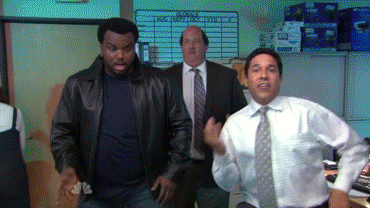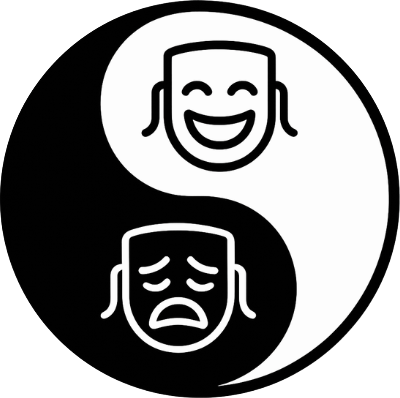Let's Talk About Our Content Diet
We've all heard the saying, "You are what you eat". What, then, determines who we become?
Since 2010, humans have been consuming a global average of 400 minutes of media per day. That was just the global average, pre-pandemic. For most of us reading, this number is currently much higher.
Whether we recognise it or not, the content we absorb significantly influences the person we become. And as actors, this has the added dimension of shaping the artist we become too.
So let's talk about our content diet. Our future selves will thank us for it.
Backed by science; built for the stage and screen.
👊 Actors:
Get evidence-informed insights and strategies to support your performance and well-being. Join the Dojo e-newsletter tribe and make thriving your reality.
🧭 Drama schools & Production companies:
Bring pioneering, research-backed coaching into your classroom or rehearsal room. Let’s talk about supporting your actors to perform at their peak – and stay well in the process.
The age of mindless consumption
The term "content diet" refers to the sum total of information and media we feed ourselves on a daily basis. This includes films, TV, video games, social media, blogs, newspapers, magazines, music, podcasts, and everything in between.
Today's "always-on" world has seen our content diets balloon. Which isn't an evil in and of itself, but in the same way widespread access to high-calorie, low-quality foods has led to physical overconsumption, increased hyper-connectivity has led to mental.
We can comprehend the problem this presents more clearly when we follow this parallel. While none of us have to indulge in high-calorie, low-quality foods just because they're so prevalent, it's certainly far easier to. Ditto, low-quality content.
For us as artists, we need to be especially on guard. Cultural commentator David Brooks speaks to this necessity in his "theory of maximum taste". From Brooks:
"This theory is based on the idea that exposure to genius has the power to expand your consciousness. If you spend a lot of time with genius, your mind will end up bigger and broader than if you spend your time only with run-of-the-mill stuff. The theory of maximum taste says that each person's mind is defined by its upper limit—the best that it habitually consumes and is capable of consuming."
Which provokes us to ask, "Is our current content diet leading us towards the artist we want to become?"
Conscious content consumption
Curating a conscious content diet isn't to be confused with taking a digital detox. Where a digital detox demands a complete – albeit temporary – unplugging, curating a conscious content diet involves redesigning our habits for the long run. We can think of a digital detox as akin to a 30-day no sugar challenge, and a conscious content diet as a balanced, well-rounded plan for everyday nutrition.
As with our food diet, we want to ensure the vast majority of content we're consuming is high-quality. Because we're all unique artists, this won't be as black-and-white as it is with nutrition, but it's likely to mean favouring more time with Meryl than the latest reality TV star.
The prolific record producer, Rick Rubin, tells his protégés: "The only way to use the inspiration of other artists is if you submerge yourself in the greatest works of all time … If you listen to the greatest songs ever made, that would be a better way to work through [finding] your own voice today, than listening to what's on the radio now and thinking, 'I want to compete with this'."
Making the Move
To start the shift towards conscious consumption, we need to foster awareness around our current habits. To do so, we simply make a list of the films/TV/blogs/magazines etc. we're taking in regularly. This is key in the beginning. Anyone who's kept a food diary before will appreciate the astounding insight a physical record can provide.
On another list, we want to consider the artist we're ultimately striving to become. What stories do we want to be telling? Who do we want to be working with? What awards would we like to win? What do we want to stand for? How do we want to be remembered?
Armed with our two lists, it's time for the real talk: Is our current content diet leading us towards the artist we want to become?
If it isn't, all good. We needn't jump on the self-hate train. The awesome thing is that we're now aware, and therefore empowered. Whenever we feel ready (i.e. able to operate from a place other than self-criticism), we can start switching out low-quality choices for high-quality alternatives. As with our physical diet, we'll find that – over time – our content diet will come into alignment with our future artist self. Which is actually a massive achievement, so genuinely celebrate yo' legendary self when you arrive here.

Before we wrap, we want to add a little *. In the same way the occasional low-quality food indulgence has its place, infrequent low-quality content indulgences do too. Particularly when they serve a greater purpose.
For instance, we may find ourselves in a state of complete overwhelm and know that only burrowing under a thick blanket and streaming some comfort anime will deregulate our nervous system (this super-specific example may or may not be a personal one). In moments such as these, go right on ahead. Once we've brought awareness to our content consumption, we'll be able to make guilt-free exceptions with intention and compassion.
Love what you’re reading? Help us keep it flowing. Donations support the research, writing, and free sharing of evidence-informed tools for actor performance and well-being. Every dollar fuels our mission to make thriving a reality for actors everywhere 🔥
Cite us!
IG: @theactorsdojo
APA 7: Norrish, T. (2022, February 1). Let's talk about our content diet. The Actor’s Dojo. https://www.dojoactors.com/content-diet/
